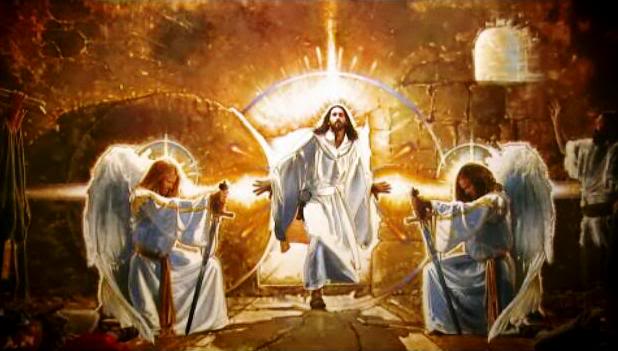April 8, 2007
Luke 24:1-12
It should be a consolation to us that the first response of the apostles to Jesus’ resurrection was one of disbelief. Luke makes this very clear in the gospel we just heard. The women come, bringing the news that Jesus has been raised from the dead, and the apostles do not believe them. The apostles consider their words an idle tale, a pile of nonsense.
This disbelief by the apostles should be an encouragement to us because believing in Jesus’ resurrection is not easy. We are asked to believe that a man, who was dead, really dead, dead and buried, was raised up by God’s power into a new kind of life. We are called to believe that that resurrection took place in bodily form. Yes, Jesus’ body was transformed but it was still a body. It could still eat and be touched by the disbelieving apostles. So the challenge to believe in Jesus’ resurrection is a major challenge. It asks us to believe something that is outside of our experience. In the world in which we live, those who are dead and buried do not rise from their tombs and appear to us in glorious bodies. To believe that Jesus did is a challenge. Yet, every Easter, we are asked to believe it. Every page of the New Testament expects us to believe it. Every time we come together to worship God, our words and our actions proclaim that we believe it. So that leaves us this morning with two questions: Why is believing in Jesus’ resurrection so important and how can we believe something which is outside of our experience?
Believing in Jesus’ resurrection is important because the resurrection of Jesus is larger than a miracle which happened to him. On Easter we do not simply believe that Jesus rose from the dead, we also believe that his resurrection is a sign that God has begun to transform the world. If God raised Jesus from the dead, it means that God is serious about destroying evil and it means that God has already begun to eliminate the evil of our world and to establish God’s Kingdom. If God has raised Jesus up, then it means that God is on the move, already establishing a kingdom of grace and peace. That kingdom will not be completed until Jesus returns, but Easter says it has irrevocably begun. So what we believe at Easter is not simply something about Jesus and what happened to him but about God and what God is doing. When we say, “Christ is Risen,” it is shorthand for saying that we believe that God is destroying evil and establishing a kingdom of justice, love, and peace. This larger understanding of what God is doing is what makes Jesus’ resurrection so important. Unfortunately it doesn’t make it easier to believe. When we look at the world around us, we can find plenty of evidence that the kingdom of God is not yet here. In fact, some would say, it is easier to believe that Jesus was raised from the dead than that God has already begun to establish a kingdom of justice, love and peace.
So that leads us to the second question: How can we believe in something that is so difficult? How can we, with so much evidence against it, believe that God is establishing a kingdom of justice, love and peace? Here’s where the words of the two men in the gospel to the women are important. They say, “Why are you looking for the living among the dead?” If we are going to believe in the truth of Easter, we must look among the living. We must look at our own lives and what is happening within them. We must try to find signs that the kingdom is being established, signs that God is at work and that Jesus’ resurrection is real.
What might those signs be? Let’s start with this one: Other people who believe. Every time we meet another person who says, I believe in Jesus’ resurrection, I believe that God is changing the world Easter becomes more possible. This is why the church bases the celebration of Easter around those who are to be baptized. Their choice to accept Christ makes our belief in Christ more real. All the people in our lives who believe help us to believe. But they are not the only signs. Each one of us can locate in our lives other signs that can point to Easter: a faithful spouse, whose love we know we could never merit, a beautiful son or daughter, a danger from which we have escaped, a sickness or addiction that should have finished us but did not, a moment of peace in the midst of grieving a loss, the ability to hope on the verge of despair. Any of these moments of grace, which we claim in our lives, can be a sign that points to the truth of Easter. None of these signs prove Jesus’ resurrection, for Easter can’t be proven. But it is only by claiming the signs that we find among the living, that we will ever believe that Jesus was truly raised from the dead.
So on this Easter morning, let us sing our Alleluias, realizing that many would consider them an idle tale, a pile of nonsense. But for those of us who can claim God’s grace in our lives, and how God has blessed us, they can be light in the darkness, life in the shadow of death, and a shout of joy which proclaims that Christ is risen and that I believe God is transforming the world. Alleluia!


Came across your name in LITURGICAL PRESS’ GIVE US THIS DAY.
Thanks for what you do.
Enjoying your website and, in particular, your homilies. Thanxalot!